Abstract
This study examined the reproducibility of information obtained from a questionnaire covering dietary and other information by comparing the answers to the questionnaires with answers to the same questions one year later. Answers from 191 men and 220 women, aged 40 to 65, in Fukuoka prefecture, Japan were compared. The surveys were conducted in November 1989 and November 1990. In the second survey, 97.2% of the first respondents answered. The concordance between the two responses was high, and the differences between the mean intakes from the two surveys were within 5% for 7 food items and within 15% for 14 food items among the 20 items about which the respondents were asked. The intraclass correlation coefficients varied from 0.30 for eggs to 0.62 for milk, with 16 items greater than 0.4. The differences in reproducibility between the sexes and two age categories were not significant. Close values also were obtained for the estimated consumption of salt. A substantially high reproducibility was observed on items regarding drinking and smoking; most of the kappa statistics and the intraclass correlation coefficients were between 0.5 and 0.9. The above reproducibility on individual food items was comparable to or better than those reported from other studies. The results of the present study thus indicate that the self-administered semiquantitative food intake questionnaire used for our cross-sectional study is useful for epidemiologic studies to assess the association between diet and various diseases. In particular, the present questionnaire is highly dependable regarding the overall group intake of foods.(ABSTRACT TRUNCATED AT 250 WORDS)
Full text
PDF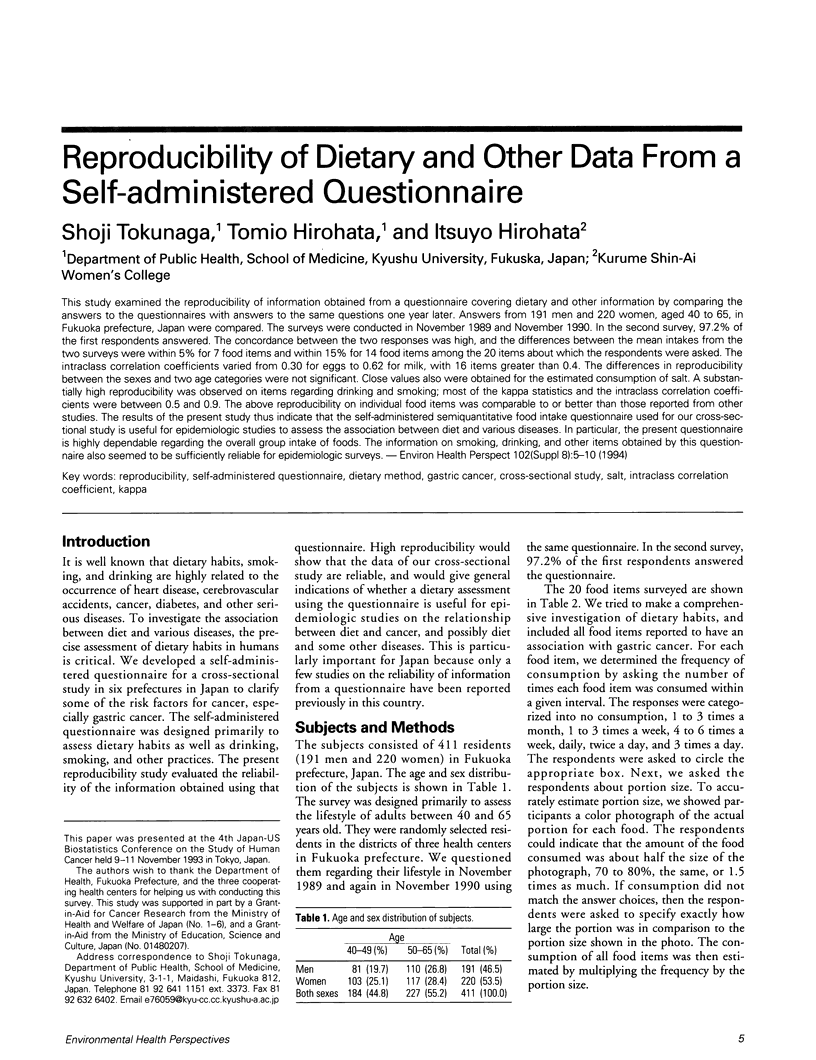
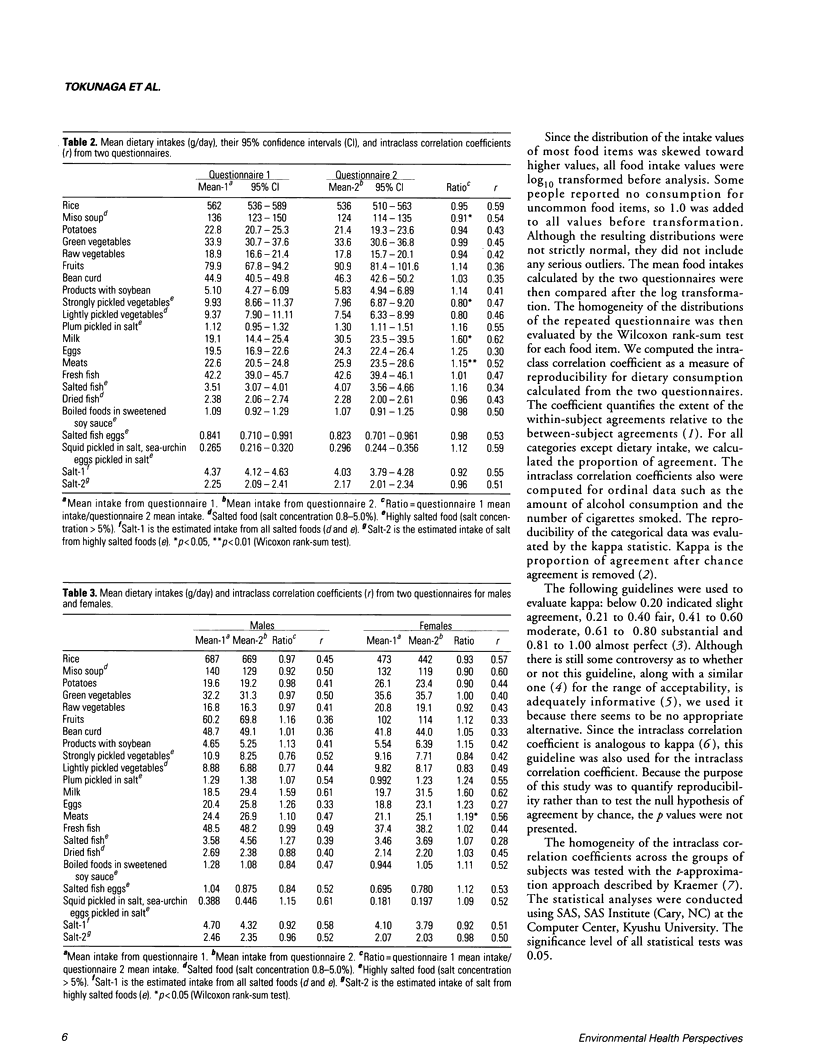
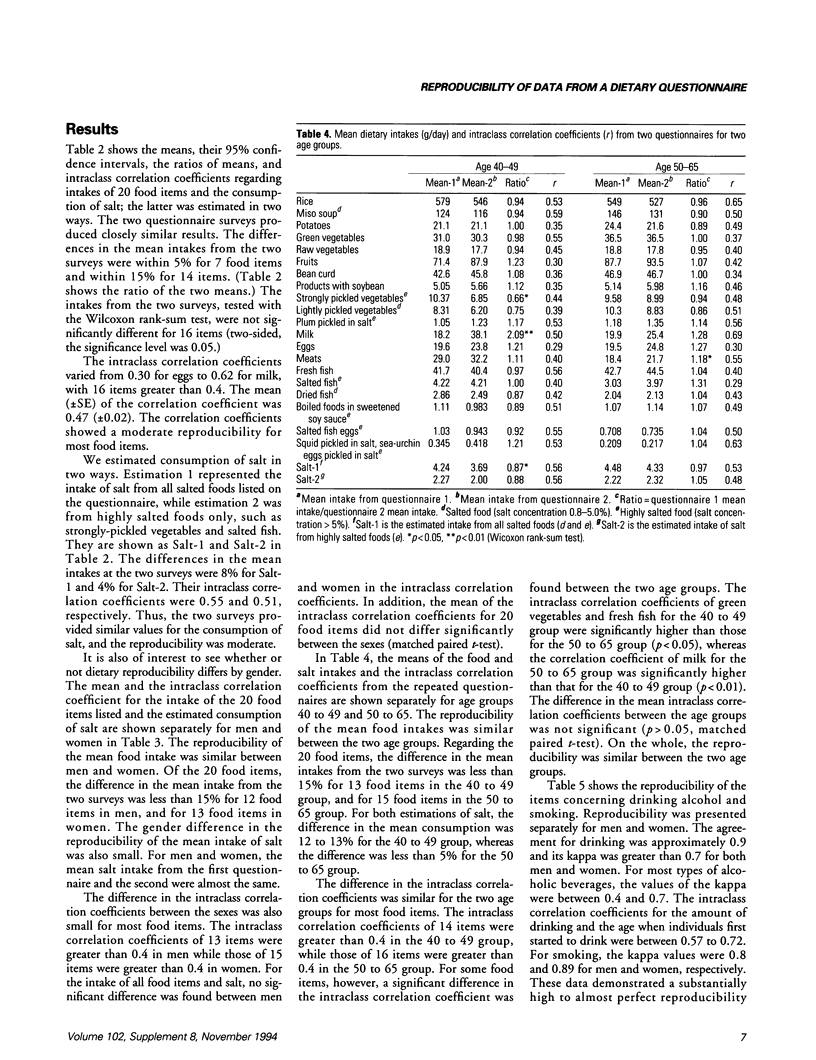
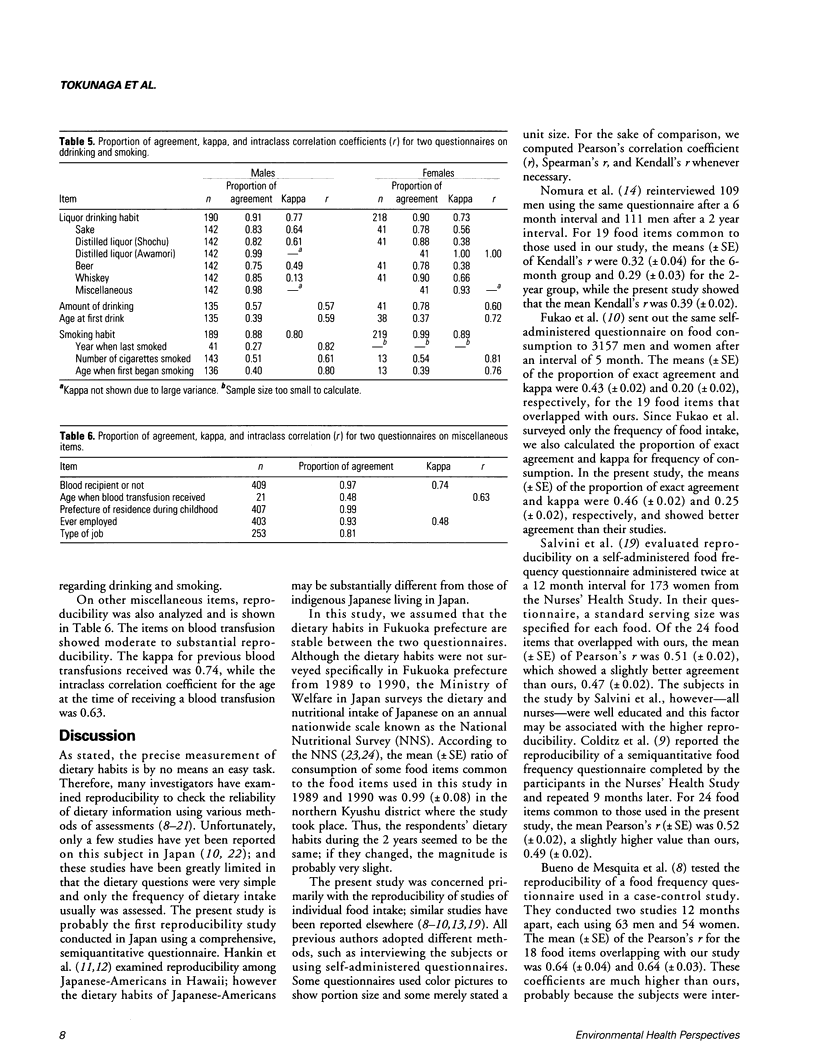
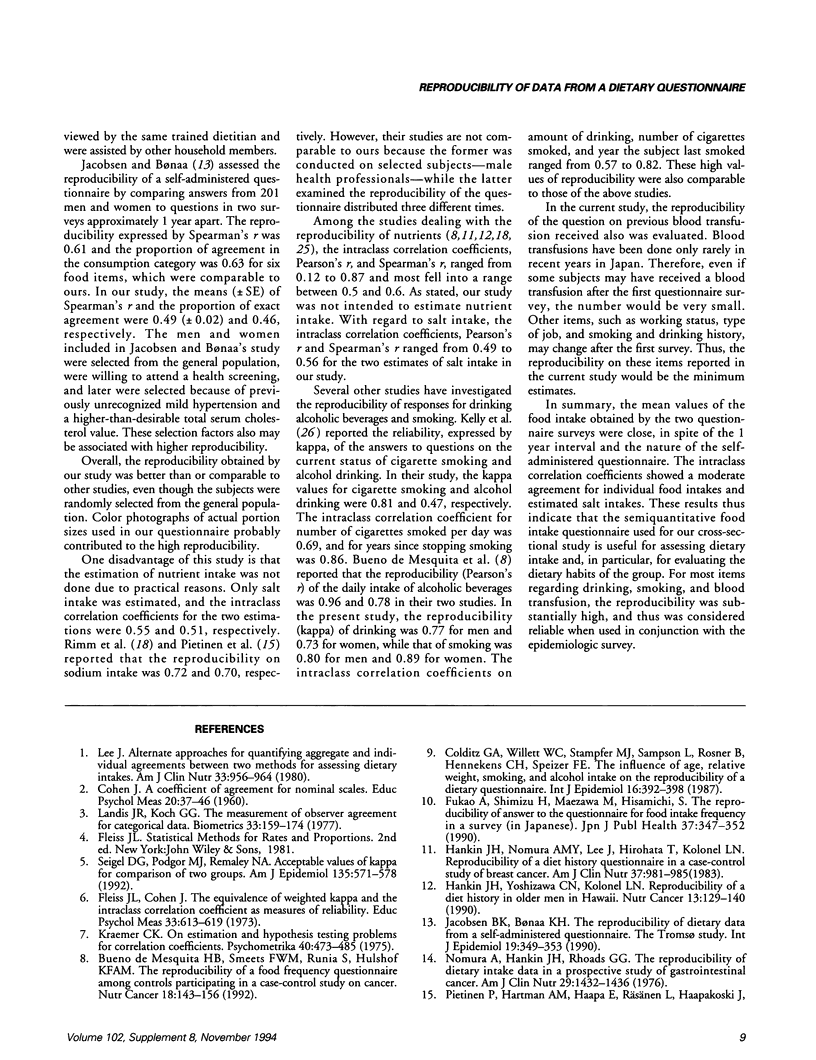
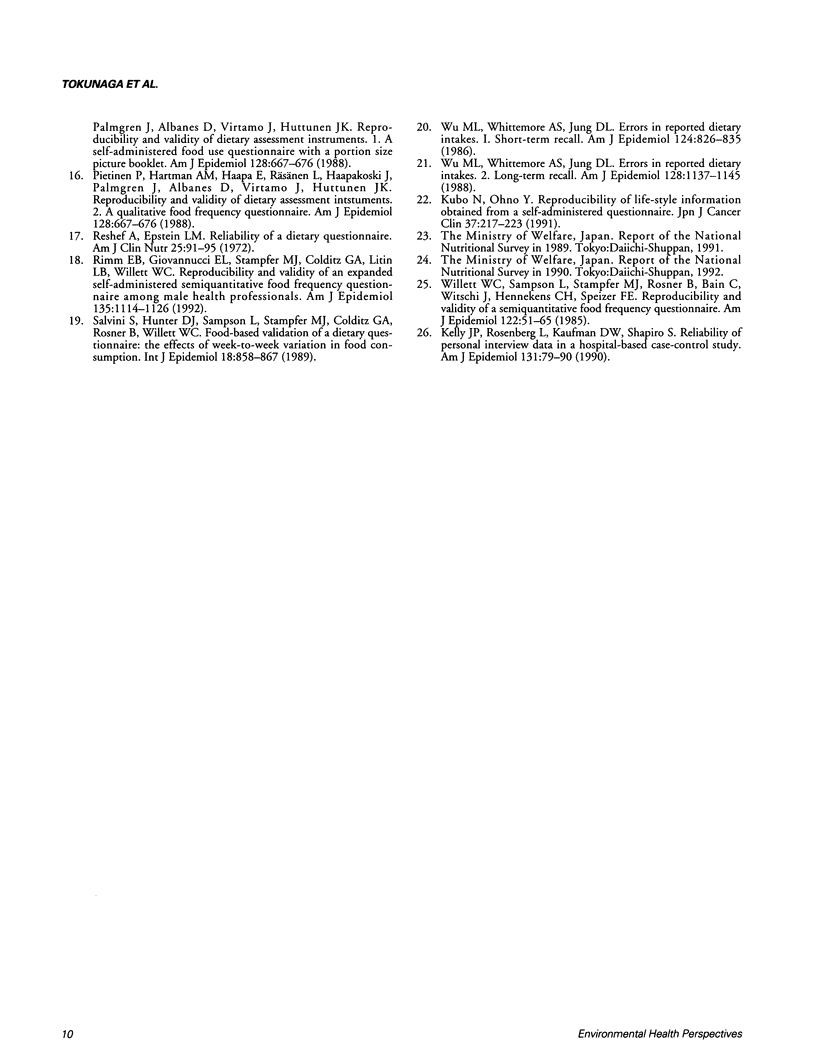
Selected References
These references are in PubMed. This may not be the complete list of references from this article.
- Bueno de Mesquita H. B., Smeets F. W., Runia S., Hulshof K. F. The reproducibility of a food frequency questionnaire among controls participating in a case-control study on cancer. Nutr Cancer. 1992;18(2):143–156. doi: 10.1080/01635589209514214. [DOI] [PubMed] [Google Scholar]
- Colditz G. A., Willett W. C., Stampfer M. J., Sampson L., Rosner B., Hennekens C. H., Speizer F. E. The influence of age, relative weight, smoking, and alcohol intake on the reproducibility of a dietary questionnaire. Int J Epidemiol. 1987 Sep;16(3):392–398. doi: 10.1093/ije/16.3.392. [DOI] [PubMed] [Google Scholar]
- Fukao A., Shimizu H., Maezawa M., Hisamichi S. [The reproducibility of answer to the questionnaire for food intake frequency in a survey]. Nihon Koshu Eisei Zasshi. 1990 May;37(5):347–352. [PubMed] [Google Scholar]
- Hankin J. H., Nomura A. M., Lee J., Hirohata T., Kolonel L. N. Reproducibility of a diet history questionnaire in a case-control study of breast cancer. Am J Clin Nutr. 1983 Jun;37(6):981–985. doi: 10.1093/ajcn/37.6.981. [DOI] [PubMed] [Google Scholar]
- Hankin J. H., Yoshizawa C. N., Kolonel L. N. Reproducibility of a diet history in older men in Hawaii. Nutr Cancer. 1990;13(3):129–140. doi: 10.1080/01635589009514054. [DOI] [PubMed] [Google Scholar]
- Jacobsen B. K., Bønaa K. H. The reproducibility of dietary data from a self-administered questionnaire. The Tromsø Study. Int J Epidemiol. 1990 Jun;19(2):349–353. doi: 10.1093/ije/19.2.349. [DOI] [PubMed] [Google Scholar]
- Kelly J. P., Rosenberg L., Kaufman D. W., Shapiro S. Reliability of personal interview data in a hospital-based case-control study. Am J Epidemiol. 1990 Jan;131(1):79–90. doi: 10.1093/oxfordjournals.aje.a115488. [DOI] [PubMed] [Google Scholar]
- Landis J. R., Koch G. G. The measurement of observer agreement for categorical data. Biometrics. 1977 Mar;33(1):159–174. [PubMed] [Google Scholar]
- Lee J. Alternate approaches for quantifying aggregate and individual agreements between two methods for assessing dietary intakes. Am J Clin Nutr. 1980 May;33(5):956–958. doi: 10.1093/ajcn/33.5.956. [DOI] [PubMed] [Google Scholar]
- Nomura A., Hankin J. H., Rhoads G. G. The reproducibility of dietary intake data in a prospective study of gastrointestinal cancer. Am J Clin Nutr. 1976 Dec;29(12):1432–1436. doi: 10.1093/ajcn/29.12.1432. [DOI] [PubMed] [Google Scholar]
- Pietinen P., Hartman A. M., Haapa E., Räsänen L., Haapakoski J., Palmgren J., Albanes D., Virtamo J., Huttunen J. K. Reproducibility and validity of dietary assessment instruments. II. A qualitative food frequency questionnaire. Am J Epidemiol. 1988 Sep;128(3):667–676. doi: 10.1093/oxfordjournals.aje.a115014. [DOI] [PubMed] [Google Scholar]
- Reshef A., Epstein L. M. Reliability of a dietary questionnaire. Am J Clin Nutr. 1972 Jan;25(1):91–95. doi: 10.1093/ajcn/25.1.91. [DOI] [PubMed] [Google Scholar]
- Rimm E. B., Giovannucci E. L., Stampfer M. J., Colditz G. A., Litin L. B., Willett W. C. Reproducibility and validity of an expanded self-administered semiquantitative food frequency questionnaire among male health professionals. Am J Epidemiol. 1992 May 15;135(10):1114–1136. doi: 10.1093/oxfordjournals.aje.a116211. [DOI] [PubMed] [Google Scholar]
- Salvini S., Hunter D. J., Sampson L., Stampfer M. J., Colditz G. A., Rosner B., Willett W. C. Food-based validation of a dietary questionnaire: the effects of week-to-week variation in food consumption. Int J Epidemiol. 1989 Dec;18(4):858–867. doi: 10.1093/ije/18.4.858. [DOI] [PubMed] [Google Scholar]
- Seigel D. G., Podgor M. J., Remaley N. A. Acceptable values of kappa for comparison of two groups. Am J Epidemiol. 1992 Mar 1;135(5):571–578. doi: 10.1093/oxfordjournals.aje.a116324. [DOI] [PubMed] [Google Scholar]
- Willett W. C., Sampson L., Stampfer M. J., Rosner B., Bain C., Witschi J., Hennekens C. H., Speizer F. E. Reproducibility and validity of a semiquantitative food frequency questionnaire. Am J Epidemiol. 1985 Jul;122(1):51–65. doi: 10.1093/oxfordjournals.aje.a114086. [DOI] [PubMed] [Google Scholar]
- Wu M. L., Whittemore A. S., Jung D. L. Errors in reported dietary intakes. I. Short-term recall. Am J Epidemiol. 1986 Nov;124(5):826–835. doi: 10.1093/oxfordjournals.aje.a114459. [DOI] [PubMed] [Google Scholar]
- Wu M. L., Whittemore A. S., Jung D. L. Errors in reported dietary intakes. II. Long-term recall. Am J Epidemiol. 1988 Nov;128(5):1137–1145. doi: 10.1093/oxfordjournals.aje.a115056. [DOI] [PubMed] [Google Scholar]


